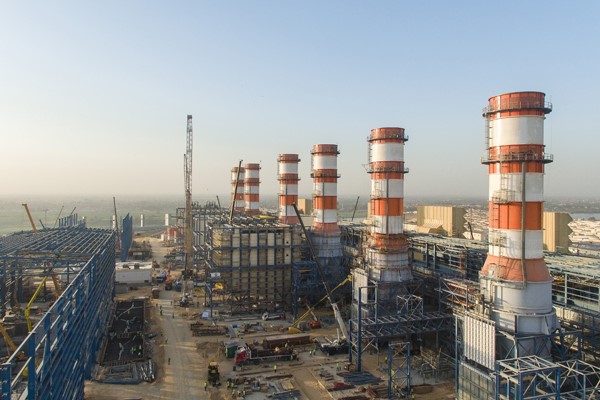Power stations to be sold
Source:Ahram Online
From:Taiwan Trade Center, Cairo
Update Time:2019/09/16

One of three Siemens power plants inaugurated in Egypt last year
Plans are afoot to sell three power stations to foreign investors to ease debt burdens on the electricity sector, reports Safeya Mounir
The Ministry of Electricity has recently received offers from a company owned by Blackstone, an alternative investment firm, and Malaysian Edra Power to buy three power stations co-established by Siemens AG.
If one of the offers is accepted, Egypt will buy electricity from the winning bidder according to a power-purchasing agreement.
Selling the three power stations, inaugurated a year ago and located in Beni Sweif, Borollos, and the New Administrative Capital, will ease the financial burden on the electricity sector, which is heavy with “debts due to be paid in installments from the building costs,” said Mohamed Salah Al-Sobki, former head of the Renewable Energy Authority.
In September, Egypt signed a $352 million contract with Siemens AG and Siemens Technologie in Germany to manage the three plants.
Payments for the eight-year deal to operate, maintain and manage the three plants were scheduled to start after four years. The cost was agreed to be split into a LE2.6 billion local currency tranche and a 176 billion euros foreign tranche, the equivalent of LE3.7 billion.
In 2017, the Ministry of Electricity planned for the three plants to be sold on the stock exchange as part of the government’s initial public offerings (IPOs) programme. The Egyptian Electricity Holding Company announced a tender for the management and maintenance of the three stations, which involved 10 companies including Siemens, an Orascom-ADERA Energy consortium, an Al-Sewidi-EDF consortium, Germany’s STEAG, Hassan Allam, a Triangle-GD France consortium, Korea’s Doosan and Japan’s Mitsubishi.
The plants cost six billion euros ($6.7 billion) to build and were mainly financed by a consortium of lenders led by Deutsche Bank, HSBC Holdings and KfW-IPEX Bank.
According to Bloomberg, Siemens Egypt, which operates the three plants under an eight-year contract, said that “power-purchase agreements between utilities and private power companies or investors are common worldwide. Chief executive officer Emad Ghaly said his firm is committed to operating and maintaining them until 2024.”
Al-Sobki does not believe the sale of the power plants falls within the frame of privatisation, however. “This is a competitive market. Whether the plants are state-owned or belong to a foreign investor, competition is taking place in a free market,” he said, adding that privatisation occurred chiefly when an establishment operating in the framework of subsidies was sold.
That was not the case here, he said, since the electricity sector was already open to all.
The Siemens plants produce 20 per cent of Egypt’s power-generation capacity, he said, adding that the maximum power consumption in Egypt was less than 32 gigawatts (GW), whereas total power generation stood at 54 GW.
The three plants of Beni Sweif, Borollos and the New Administrative Capital have a total capacity of 14.4 GW.
Al-Sobki said that opportunities were thus abundant to export electricity and the chances of the sector’s growth were high.
According to Hafez Al-Salmawi, former head of the Egyptian Electric Utility and Consumer Protection and Regulatory Authority (EgyptERA) and professor of power engineering at Zagazig University, the presence of the private sector as a player in the electricity sector guarantees better operation, management and maintenance.
Usually, private electricity plants are better operated than public-sector ones, he added.
He said that power plants could “sell like hot cakes” on the stock exchange due to the sector’s reputation for honouring its commitments and paying its dues to foreign lenders.
Selling the plants would decrease the debts owed by the electricity sector, while selling parts of them according to the power-purchasing agreement would guarantee returns on payment, he said.
Egypt’s 2019-20 budget revealed that debt guaranteed by the Ministry of Finance represented 20.4 per cent of GDP by the end of 2018. About a quarter of that was owed by electricity companies, according to Bloomberg.
To guarantee appropriate offers and purchase prices, there should be extensive preparations before the sell-off, Al-Salmawi said, stressing that good promotion would yield the best offers.
Economic analysts believe that selling the plants will help lower Egypt’s foreign debt. Mohamed Abu Basha, a macroeconomic analyst at EFG Hermes, an investment bank, said that when the plants are sold their debts will be transferred to the buying companies and not the government.
Selling the power plants to foreign investors is expected to yield $6.5 billion, said Hani Tawfik, former head of the Egyptian and Arab Direct Investment Association. The move would lower the country’s foreign debts and allow the government to give up its managerial role and focus on planning and consumer protection, he said.
Source:http://weekly.ahram.org.eg/News/27308.aspx